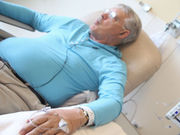Adapted treatment guided by interim PET results linked to good overall, progression-free survival
THURSDAY, June 23, 2016 (HealthDay News) — Adapted treatment guided by positron emission tomography-computed tomography (PET-CT) results is associated with good outcomes in advanced Hodgkin’s lymphoma, according to a study published in the June 23 issue of the New England Journal of Medicine.
Peter Johnson, M.D., from the Cancer Research UK Centre at the University of Southampton, and colleagues assessed use of interim PET-CT as a measure of early response to chemotherapy in 1,214 patients with newly diagnosed advanced Hodgkin’s lymphoma. Patients underwent a baseline PET-CT and an interim scan after receipt of two cycles of doxorubicin, bleomycin, vinblastine, and dacarbazine (ABVD) chemotherapy. Patients with negative PET findings were randomized to continue ABVD or omit bleomycin (AVD) for cycles three through six; those with positive findings received bleomycin, etoposide, doxorubicin, cyclophosphamide, vincristine, procarbazine, and prednisone (BEACOPP).
The researchers found that 83.7 percent of the 1,119 patients who underwent an interim PET-CT had negative findings. The three-year progression-free and overall survival rates were 85.7 and 97.2 percent, respectively, in the ABVD group and 84.4 and 97.6 percent, respectively, in the AVD group (absolute difference in three-year progression-free survival, 1.6 percent). The ABVD group had more severe respiratory adverse events. One hundred seventy-two patients received BEACOPP, and 74.4 percent had negative findings on a third PET-CT scan. Three-year progression-free and overall survival rates were 67.5 and 87.8 percent, respectively.
“Disease control of advanced Hodgkin’s lymphoma after interim-PET-adapted therapy showed overall outcomes at least as good as in our previous studies,” the authors write.
Copyright © 2016 HealthDay. All rights reserved.








